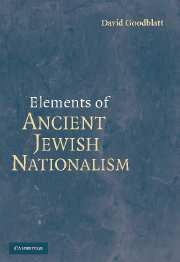Book contents
- Frontmatter
- Contents
- List of Abbreviations
- Preface
- 1 Theoretical Considerations: Nationalism and Ethnicity in Antiquity
- 2 Constructing Jewish Nationalism: The Role of Scripture
- 3 Constructing Jewish Nationalism: The Hebrew Language
- 4 A Kingdom of Priests: The Priestly Component in Ancient Jewish Nationalism
- 5 Israel Nationalism
- 6 Judah Nationalism
- 7 Zion Nationalism
- 8 Conclusions: Jewish Nationalism – What Rose and What Fell?
- Bibliography
- Author Index
- Index
5 - Israel Nationalism
Published online by Cambridge University Press: 20 July 2009
- Frontmatter
- Contents
- List of Abbreviations
- Preface
- 1 Theoretical Considerations: Nationalism and Ethnicity in Antiquity
- 2 Constructing Jewish Nationalism: The Role of Scripture
- 3 Constructing Jewish Nationalism: The Hebrew Language
- 4 A Kingdom of Priests: The Priestly Component in Ancient Jewish Nationalism
- 5 Israel Nationalism
- 6 Judah Nationalism
- 7 Zion Nationalism
- 8 Conclusions: Jewish Nationalism – What Rose and What Fell?
- Bibliography
- Author Index
- Index
Summary
In his brief excursus on the name “vietnam,” benedict Anderson makes the following observation.
That today's Vietnamese proudly defend a Viêt Nam [a name] scornfully invented by a nineteenth-century Manchu [i.e., Chinese] dynasty reminds us … of the imaginative power of nationalism.
Anderson's observation illustrates the need to avoid the genetic fallacy when considering the history of a nation. A name whose conception was in imperialism could still become the slogan of a nationalist movement. The case of Palestine provides a contemporary example. Deriving from the ethnonym of invading colonizers from the West, imposed on the country by the Roman Empire after suppressing a native revolt, and resurrected by British imperialists after they seized the area from the Ottomans, the name has been adopted by Arabs claiming to descend from the ancient, autochthonous inhabitants of the country. Despite the ironies suggested by the sagas of Viêt Nam and Palestine, studying the names chosen to express national identity could be useful. The choice of a name and the circumstances that led to its adoption may illuminate the history of the nationalist movement in question. In the next three chapters I shall examine in turn three different names that have played a role in ancient Jewish nationalism: Israel, Judah, and Zion. Using these names as an organizing principal will, it is hoped, contribute to an understanding of this phenomenon and its history. I begin with Israel.
- Type
- Chapter
- Information
- Elements of Ancient Jewish Nationalism , pp. 108 - 139Publisher: Cambridge University PressPrint publication year: 2006

